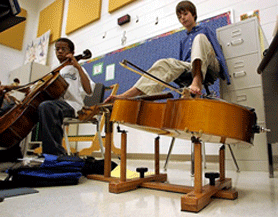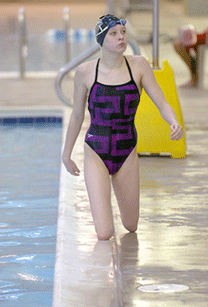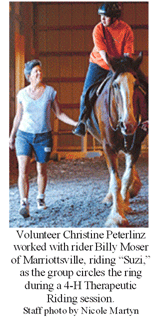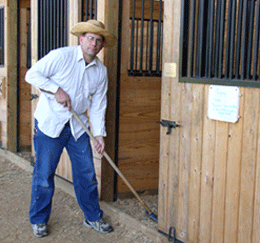
Although I have a reputation for reading (too) many newspapers, I’ll tell ya a secret – I really scan the articles and just look at the pictures. Often the articles have too many big words for me.
In all seriousness, I am a newspaper photograph junkie and I had noticed Lindy Keast Rodman’s work in the Richmond Times-Dispatch some time ago.
I found this picture in “The Day in Pictures” section of the Baltimore Sun web site. I recognized the name of the photographer and went to the Richmond Times-Dispatch web site to try and find the picture on the web site…
I did not find the picture, but I found the article for which the picture may very well have accompanied. The article, “With feet and toes, young cellist makes beautiful music,” By HOLLY PRESTIDGE, Richmond Times-Dispatch; is worth a quick read. You can find it here.
It begins:
HANOVER, Va. - George Dennehy sits first chair in the cello section of the string orchestra at Oak Knoll Middle School in Hanover County.
As he leans back slightly on a stool, the toes on George's right foot move over the cello's strings as the toes on his left foot control the bow.
George's feet are his hands; his toes are his fingers. He was born with bilateral upper-limb deficiency, so he has no limbs beyond his shoulder blades.
He has learned to do almost everything with his feet _ typing on the computer, eating, setting the table, opening doors, playing the cello.
Read the rest here. (I do not know if the Richmond Times-Dispatch uses permalinks – so if you are accessing this post and the link is dead, e-mail me at kevindayhoff(at)gmail.com and I’ll load the rest of the article…)
Thank you Richmond Times-Dispatch, Holly Prestidge and Lindy Keast Rodman, for a great and uplifting story.
This great picture of Mr. Dennehy provides a bit of a springboard to mention the importance of Special Education programs in our school systems and the subject of mainstreaming.
When at all possible, I believe passionately about mainstreaming, i.e., integrating children with disabilities or special needs into the classrooms as much as possible. The rewards for all the children and society in general far outweigh the expense.
Give a child a chance and they will engage, adapt and overcome every time; provided they are given the proper opportunity to excel; given proper support and allowed to develop compensatory approaches to many of the day-to-day activities we tend to accept as routine.
And this is win-win for everyone.
Kevin









